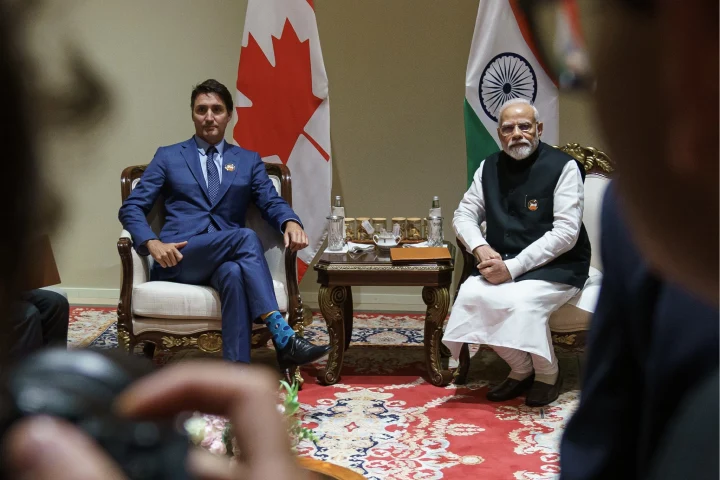

India has asked Canada to recall over 40 of its diplomats from India.
While Canadian Prime Minister Justin Trudeau was in New Delhi for the G 20 summit, a referendum event by Khalistani separatists was held in a Gurudwara of Surrey. The so-called “referendum” was organised on Sunday, September 10, the same day Prime Minister Narendra Modi conveyed to his Canadian counterpart Justin Trudeau about India’s concern over secessionism and inciting violence against Indian diplomats in Canada.
Khalistani separatist and Sikhs For Justice founder Gurpatwant Singh Pannun, who had gone into hiding after recent deaths of Khalistani leaders, made a public appearance at the referendum and delivered an instigating speech hinting at ‘balkanizing’ India. He was escorted by a team of security guards. The anti-India referendum was organised at the Guru Nanak Singh Gurudwara in Surrey. This is the same Gurudwara outside which Khalistani terrorist Hapreet Singh Nijjar was shot dead in June. The vote was earlier scheduled to be held at a Canadian government school but the permission was revoked after an uproar.
In his talks with Trudeau on the side-lines of the G20 Summit, PM Modi also mentioned that a relationship based on “mutual respect and trust” is essential for the progress of the India-Canada relationship. Surprisingly Trudeau’s responding after this meeting maintained that Canada would defend freedom of expression, freedom of conscience, and freedom of peaceful protest. “We are always there to prevent violence and to push back against hatred,” he added.
This stance is not something new for the Canadian Prime Minister who is known to be giving in to the political pressure from his coalition partner. Trudeau’s Liberal Party’s minority government was formed after the 2021 election and relies on the support of the New Democratic Party (NDP), led by Jagmeet Singh Dhaliwal, who is known for his vocal support of the Khalistani cause. Singh’s NDP won 24 seats in the 2021 election, making it crucial for the survival of Trudeau’s government. Singh even raised his voice during the farmer’s protest, and the subsequent police crackdown on protests led by Amritpal Singh. Trudeau has been walking a thin rope balancing pro Khalistani Singh’s support and bilateral ties with India.
The issue of Khalistani extremism in Canada has been contentious, and in recent years, Canada has witnessed a series of anti-India incidents involving Khalistani separatists. These events have included parades celebrating the assassination of former Indian Prime Minister Indira Gandhi and gatherings outside the Indian Embassy in Ottawa where anti-India slogans were raised, and an Indian journalist was reportedly assaulted. Following this, the Indian government summoned the Canadian ambassador in New Delhi to express concerns about the growing active presence of pro-Khalistani groups in Canada. External Affairs Minister S Jaishankar even urged partner countries like Canada, the UK, and the US not to provide space for “extremist Khalistani ideology,” reminding them that it would be detrimental to bilateral relations. The ‘soft’ approach towards Khalistani is creating tension with India.
Union Minister of Coal and Mines G Kishan Reddy on Tuesday held an inter-ministerial meeting…
India's largest automobile in-plant railway siding at Maruti Suzuki's Manesar facility started operation on Tuesday,…
Google on Tuesday unveiled its Safety Charter for India's AI-led transformation, at the "Safer with…
The human rights organisation of the Baloch National Movement (BNM), Paank, has published its most…
The Israel Defence Forces (IDF) on Tuesday claimed that it has killed Iran's senior-most military…
Amid escalating conflict between Iran and Israel, the Ministry of External Affairs (MEA) on Tuesday…